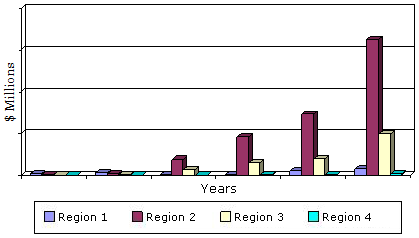BCC Research expects the market to grow to $442.4 million by 2018, and register a five-year compound annual growth rate of 17.4% from 2013 to 2018.
According to a new technical market research report Biogas Upgrading: Technologies and Global Markets, from BCC Research (www.bccresearch.com), the global market for biogas upgrading equipment is estimated at $198.7 million for 2013. BCC Research expects the market to grow to $442.4 million by 2018, and register a five-year compound annual growth rate of 17.4% from 2013 to 2018.
Sponsors
Sponsors
Biogas is generated through a microbial fermentation process known as anaerobic digestion (AD), by which various waste streams can be cost-effectively converted into electricity and thermal energy. At the heart of the technology is the anaerobic digester, which in combination with a turbine or gas engine, can serve as a complete power plant. Solid waste landfills also generate a recoverable biological gas through natural AD. Large quantities of gaseous fuel methane can be produced by the process; a valuable by-product in the form of fertilizer also is generated.
In the U.S. Energy Information Administration’s (EIA) International Energy Outlook 2013, total world consumption of marketed energy is predicted to increase by 56% between 2010 and 2040. Renewable energy and nuclear power are the world’s fastest-growing energy sources, each increasing by 2.5% per year. In recent years, the world market for biogas plants and AD equipment has increased at a rate of 20% to 30% annually, depending on the country. Recently, however, growth rates have slowed as countries, notably Germany, find subsidies for biogas production too expensive.
Legislation and the desire to cut greenhouse gas emissions (GHGs) are the most important drivers for biogas plant construction. Kyoto Protocol requirements and specifications of the EU Renewable Energy Directive (RED) are two examples of this type of legislation. Energy security, the desire to draw on domestic fuel resources, and elimination of the expense and price volatility of imported fossil fuel also encourage interest in biogas. Worldwide, the majority of countries have targets for renewable energy production, GHG mitigation or laws related to minimizing harmful landfill emissions.
Renewable, sustainable energy generation will be the fastest-growing energy sector over the next two decades. Price volatility, supply concerns and the environmental aspects of fossil fuels are expected to accelerate the pace of all non-fossil fuel development.
This technical market research report from BCC Research provides an overview of the global market for biogas upgrading equipment. Market value and growth is evaluated for six different types of upgrading systems, including water scrubbing, pressure swing adsorption (PSA), physical absorption, chemical absorption, membrane separation and cryogenic technology. Additionally, the market is examined according to end use, injection into the gas grid and transportation fuel. A discussion of the market by world region includes overviews of North America, Europe, Asia, and the rest of the world, with individual profiles for countries most active in each region. Present market status, biogas upgrading plant installations, and policies and incentives that support the industry are given for each country. All market valuations and projections cover the years from 2000 to 2018.
SAMPLE FIGURE
MARKET SIZE AND GROWTH FOR BIOGAS UPGRADING EQUIPMENT BY WORLD REGION, 2000-2018
($ MILLIONS)

Source: BCC Research
This report is intended to be useful to a broad audience, including manufacturers and suppliers of biogas upgrading equipment and providers of upgrading technology. Companies with plant components, ancillary equipment and related products also will profit from this study, including manufacturers and suppliers of anaerobic digesters and digester technology, biogas distributors, water and power engineering firms, suppliers of power plants and electricity generating equipment, environmental management firms, companies specializing in anaerobic digestion equipment and other water and wastewater treatment equipment, companies developing additives to enhance gas production yields and process efficiencies.









